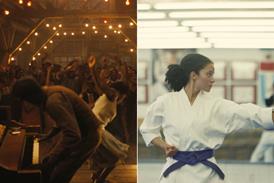Muayad Alayan makes his feature debut with Love, Theft and Other Entanglements, a Palestinian feature screening in Panorama.
His brother Rami Alayan produces and co-wrote the script (in addition to doing production design, and playing a falafel seller on screen).
The story follows small time criminal Mousa, living in a Palestinian refugee camp and stealing Israeli cars to make money to move abroad. But he finds himself in a ridiculous situation when he finds a kidnapped Israeli soldier in the boot of one of his stolen cars.
The film has a fresh approach to both its production and its storytelling. On the production side, it was financed by the brothers’ personal savings, support from friends and family and in-kind donations, plus a cast and crew willing to pitch with many hats on. An indiegogo crowdfunding campaign helped raise funds for post-production. The director even lent his own car to star in the film (he still drives it).
“It was hard but it worked out in the end,” says Muayad of the guerrilla-style approach.
The film shot for 22 days with conditions that were challenging to say the least – the lead actor was only allowed to shoot in areas of Jerusalem during Easter for permissions reasons. One actress had a nightly curfew. There was also the matter of filming with guns (real or fake) that needed approvals from Palestinian intelligence agencies, who couldn’t work in the same area as the Israeli army.
In terms of style, the film is influenced by the French New Wave or the American independent scene. It is shot in black-and-white with a jazzy soundtrack. “Films of Jarmusch and Godard are influential on our filmmaking,” says Muayad.
They describe the film as part drama, part thriller and part fairytale. “I wanted to make a story about a man who is sick of the situation around him and he also wants to get away from the issues of his own life,” Muayad adds.
Of the tone, which can be light or darkly comic, Muayad adds, “It used to be that crossing checkpoints every day, I was angry, I felt very serious about this…Now I feel sorry for us, me and the solder both. Here’s a soldier with a machine gun thought through my vegetables.”
The decision to shoot in black-and-white was important for that fairytale feel. “One reason to shoot in black and white is that we wanted to step away from the images that everyone sees in the news,” says Muayad. (It also made the art direction and lighting simpler, his brother adds.)
The brothers and their production collective Palcine are next planning a larger-budgeted film that will hopefully attract European co-producers. As Rami says, “It’s about a Palestinian couple and Israeli couple in Jerusalem dealing with a social issue. It’s personal but it’s wrapped in the political context.”





















No comments yet